

An Overview of Age-related Memory Loss. Worried about your forgetfulness? Learn what’s normal when it comes to memory and aging, and how to recognize the signs of more serious problems. Memory and aging We’ve all misplaced keys, blanked on someone’s name, or forgotten a phone number.
When you’re young, you don’t tend to pay much attention to these lapses, but as you grow older, you may worry about what they mean. Perhaps you start to talk about a movie you saw recently when you realize you can’t remember the title. As you grow older, you experience physiological changes that can cause glitches in brain functions you’ve always taken for granted. Age-related memory loss The brain is capable of producing new brain cells at any age, so significant memory loss is not an inevitable result of aging. Furthermore, many mental abilities are largely unaffected by normal aging, such as: Memory Disorders.
Improves memory and thinking skills. There are plenty of good reasons to be physically active.
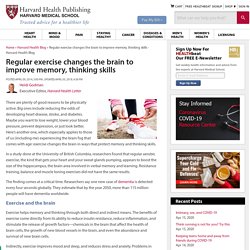
Big ones include reducing the odds of developing heart disease, stroke, and diabetes. Maybe you want to lose weight, lower your blood pressure, prevent depression, or just look better. Here’s another one, which especially applies to those of us (including me) experiencing the brain fog that comes with age: exercise changes the brain in ways that protect memory and thinking skills. In a study done at the University of British Columbia, researchers found that regular aerobic exercise, the kind that gets your heart and your sweat glands pumping, appears to boost the size of the hippocampus, the brain area involved in verbal memory and learning. Resistance training, balance and muscle toning exercises did not have the same results.
The finding comes at a critical time. Prevents Alzheimer's Disease. As they get older, many people worry about developing Alzheimer's disease or a related dementia.
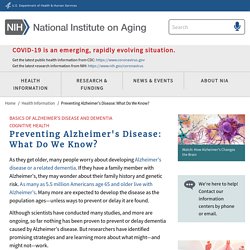
If they have a family member with Alzheimer's, they may wonder about their family history and genetic risk. As many as 5.5 million Americans age 65 and older live with Alzheimer's. Many more are expected to develop the disease as the population ages—unless ways to prevent or delay it are found. Although scientists have conducted many studies, and more are ongoing, so far nothing has been proven to prevent or delay dementia caused by Alzheimer's disease.
Promotes creativity. When we think of the benefits of recreational activities for seniors, the first thing that comes to mind is often the enjoyment value.
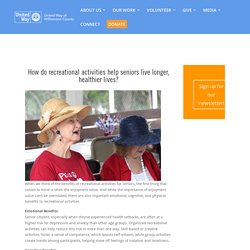
And while the importance of enjoyment value can’t be overstated, there are also important emotional, cognitive, and physical benefits to recreational activities. Emotional Benefits Senior citizens, especially when they’ve experienced health setbacks, are often at a higher risk for depression and anxiety than other age groups. Organized recreational activities can help reduce this risk in more than one way. Skill-based or creative activities foster a sense of competence, which boosts self-esteem, while group activities create bonds among participants, helping stave off feelings of isolation and loneliness. Builds problem-solving skills. Helps to manage stress.
We all need to face different kinds of mental stress in various stages of life.
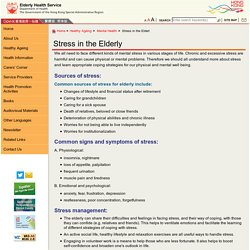
Guidelines. FOUR BLOCKS OF FITNESS: Balance, Cardio, Strength & Flexibility. A Harvard Health article A Guide to Getting Started and Developing a Balanced Plan.
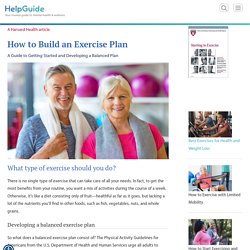
Balance Exercises. Strength Training. Cardio Exercises. Flexibility Exercises. Incorporate into daily routine. List of Fun Activities for Older Adults. There are hundreds of different ways that you can get up and get active today.
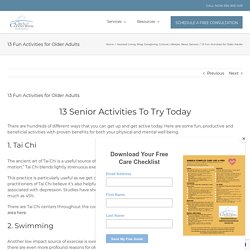
Here are some fun, productive and beneficial activities with proven benefits for both your physical and mental well being. 1. Tai Chi The ancient art of Tai Chi is a useful source of exercise for people of all ages. Sometimes referred to as “meditation in motion,” Tai Chi blends lightly strenuous exercise with stretching and mindfulness. This practice is particularly useful as we get older. There are Tai Chi centers throughout the country that offer beginner classes in Tai Chi. 2. Another low impact source of exercise is swimming. Plus, swimming is extremely refreshing on a hot day, and by its very nature, it eliminates the risk of heat exhaustion or heat stroke while exercising. 3. One of the best ways to remain active while also enjoying the great outdoors is walking or hiking. It’s also a great way to take in the great outdoors. 4.
Gardening also helps to foster a sense of accomplishment, as well. 5. 6. 7. Resource for Activity Ideas. Importance of Social Activities for Older Adults. 10 Best Social Activities for Older Adults. Are you in the process of trying to choose an assisted living facility for a loved one?
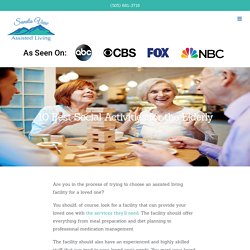
You should, of course, look for a facility that can provide your loved one with the services they’ll need. The facility should offer everything from meal preparation and diet planning to professional medication management. The facility should also have an experienced and highly skilled staff that can tend to your loved one’s needs. You want your loved one to be as comfortable as possible at all times. But there’s one other thing a facility should facilitate: Activities for seniors in assisted living. Tackle challenges of social engagement in later life.
What is brain training? - Alzheimer's Society. List of brain exercises. “Use it or lose it” commonly refers to the importance of exercising your body and staying fit.
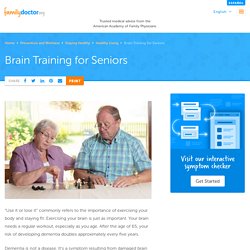
Exercising your brain is just as important. Your brain needs a regular workout, especially as you age. After the age of 65, your risk of developing dementia doubles approximately every five years. Dementia is not a disease. It’s a symptom resulting from damaged brain cells that affect your memory, personality, and decision-making abilities. While some forms of dementia cannot be cured and the brain damage cannot be reversed, research shows that keeping your brain active with activity, a healthy diet, and physical exercise can make a difference. Sudoku. Crossword. Word Search - Seniors online. Body Image Issues & the Importance of Body Positivity. A growing number of older British people – including those in their 70s and 80s – are suffering from low self-esteem and anxieties relating to body image.
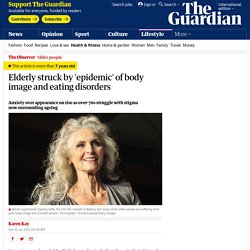
Interviewed for the Observer Magazine this weekend, Professor Nichola Rumsey, co-director of the University of the West of England's centre for appearance research, suggests that "as adults, 90% of British women feel body-image anxiety". She said: "It doesn't wane – many women in their 80s are still anxious about the way their bodies look, which can even affect their treatment in hospital when their health choices are influenced by aesthetics. " Popular opinion suggests that body image-related anxiety is a young person's problem, with recent reports focusing on the age (five years old) at which we are now vulnerable to pressures to conform to an expected ideal. Strategies to gain confidence. Lost your self-confidence?
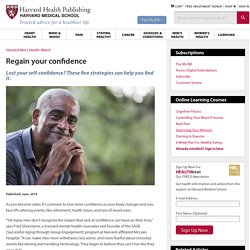
These five strategies can help you find it. As you become older, it's common to lose some confidence as your body changes and you face life-altering events, like retirement, health issues, and loss of loved ones. "Yet many men don't recognize the impact that lack of confidence can have on their lives," says Fred Silverstone, a licensed mental health counselor and founder of the SAGE (Successful Aging through Group Engagement) program at Harvard-affiliated McLean Hospital. References.